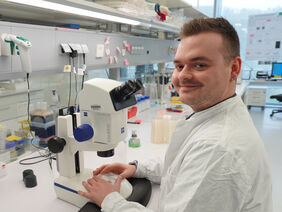Jena. At the end of February, the time had come: after successfully passing his final exams, Erik Hüttenrauch was presented with his examination results. This marked the end of his training as a biology laboratory technician at the Leibniz Institute on Aging - Fritz Lipmann Institute (FLI). A look back.
"It wasn't always a straight path," explains the 22-year-old. The reason: his training began in the coronavirus year 2020. "The conditions were quite difficult," the biology lab technician sums up. "There was a lack of social contact. I wasn't able to build any relationships with the first research groups. The closest contact was with the respective instructor," Erik Hüttenrauch looks back. Accordingly, the focus at that time was on independently preparing presentations, for example on the institute or PCR technology. Even at the vocational college in Radebeul, complete blocks had to be completed from home.
When training was finally able to take place in person again, Erik Hüttenrauch became familiar with the methods and focal points of the Morrison, Kaether, Englert, von Eyss and Ermolaeva research groups. He also completed internships within the institute at the Core Facility Laboratory Consumption Service and in the Animal Facilities mouse and fish, as well as external internships (e.g. at the Central Experimental Animal Husbandry Unit at Jena University Hospital). He learned to appreciate the advantages of training at the FLI: "Here you are directly in the groups right from the start, experiencing everyday working life at an early stage. At other training centers, topics are dealt with one after the other, e.g. you learn a method for three months. At the FLI, you get to experience the whole spectrum of tasks and are therefore more broadly based," says Erik Hüttenrauch. He particularly likes the variety at the institute. No week is like the previous one and you always learn something new. What's more: "It's cool that it's so international here."
"But the best came at the end," summarizes Erik Hüttenrauch. Immediately after completing his training, the Apolda native continued his career at the FLI. He was offered a temporary position in the ERC-LifeLongFit third-party funded research project. The "Stress Tolerance and Homeostasis" research group led by Maria Ermolaeva uses the nematode C. elegans as well as mammalian cell and organoid cultures to identify changes in metabolism and stress responses during ageing. Erik Hüttenrauch will support the project as a technical assistant in order to gain his first professional experience. "I will be joined by two postdocs, with whom I will then work on the project," he explains. In the meantime, the biology lab technician is working on his own smaller project on cell cultures and UVB radiation.
Erik Hüttenrauch's summary of his training at the FLI: "Without lockdown, I can definitely recommend the training. Despite this special time, there was always support from the trainers. I am grateful for that. And I'm very happy to be at the FLI and I'm looking forward to being able to support my group leader in her research. The training was a great time, but now I'm looking forward to my professional life."









